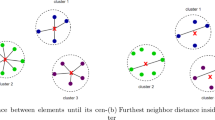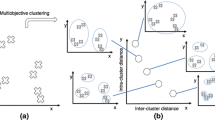Abstract
Clustering algorithm has the task of classifying a set of elements so that the elements within the same group are as similar as possible and, in the same way, that the elements of different groups (clusters) are as different as possible. This paper presents the Multi-objective Clustering Algorithm (MCA) combined with the NSGA-II, based on two intra- and three inter-clustering measures, combined 2-to-2, to define the optimal number of clusters and classify the elements among these clusters. As the NSGA-II is a multi-objective algorithm, the results are presented as a Pareto front in terms of the two measures considered in the objective functions. Moreover, a procedure named Cluster Collaborative Indices Procedure (CCIP) is proposed, which aims to analyze and compare the Pareto front solutions generated by different criteria (Elbow, Davies-Bouldin, Calinski-Harabasz, CS, and Dumn indices) in a collaborative way. The most appropriate solution is suggested for the decision-maker to support their final choice, considering all solutions provided by the measured combination. The methodology was tested in a benchmark dataset and also in a real dataset, and in both cases, the results were satisfactory to define the optimal number of clusters and to classify the elements of the dataset.
This work has been supported by FCT Fundação para a Ciência e Tecnologia within the R &D Units Project Scope UIDB/00319/2020, UIDB/05757/2020, UIDP/05757/2020 and Erasmus Plus KA2 within the project 2021-1-PT01-KA220-HED-000023288. Beatriz Flamia Azevedo is supported by FCT Grant Reference SFRH/BD/07427/2021.
Access this chapter
Tax calculation will be finalised at checkout
Purchases are for personal use only
Similar content being viewed by others
References
Arbelaitz, O., Gurrutxaga, I., Muguerza, J., Pérez, J.M., Perona, I.: An extensive comparative study of cluster validity indices. Pattern Recogn. 46(1), 243–256 (2013)
Azevedo, B.F., Rocha, A.M.A.C., Fernandes, F.P., Pacheco, M.F., Pereira, A.I.: Evaluating student behaviour on the mathe platform - clustering algorithms approaches. In: Book of 16th Learning and Intelligent Optimization Conference - LION 2022, pp. 319–333. Milos - Greece (2022)
Azevedo, B.F., Rocha, A.M.A.C., Pereira, A.I.: A multi-objective clustering approach based on different clustering measures combinations. Submitted to Computational & Applied Mathematics
Caliński, T., Harabasz, J.: A dendrite method for cluster analysis. Commun. Stat. 3(1), 1–27 (1974)
Chou, C.H., Su, M.C., Lai, E.: A new cluster validity measure and its application to image compression. Pattern Anal. Appl. 7, 205–220 (2004)
Deb, K., Pratap, A., Agarwal, S., Meyarivan, T.: A fast and elitist multiobjective genetic algorithm: NSGA-II. IEEE Trans. Evol. Comput. 6(2), 182–197 (2002)
Delgado, H., Anguera, X., Fredouille, C., Serrano, J.: Novel clustering selection criterion for fast binary key speaker diarization. In: 16th Annual Conference of the International Speech Communication Association (NTERSPEECH 2015) (2015)
Dunn, J.C.: A fuzzy relative of the ISODATA process and its use in detecting compact well-separated clusters. J. Cybern. 3(3), 32–57 (1973)
Dutta, D., Sil, J., Dutta, P.: Automatic clustering by multi-objective genetic algorithm with numeric and categorical features. Expert Syst. Appl. 137, 357–379 (2019)
Gurrutxaga, I., Muguerza, J., Arbelaitz, O., Pérez, J.M., Martín, J.I.: Towards a standard methodology to evaluate internal cluster validity indices. Pattern Recogn. Lett. 32(3), 505–515 (2011)
Heris, M.K.: Evolutionary data clustering in matlab (2015). https://yarpiz.com/64/ypml101-evolutionary-clustering
Jain, M., Jain, M., AlSkaif, T., Dev, S.: Which internal validation indices to use while clustering electric load demand profiles? Sustain. Energy Grids Netw. 32, 100849 (2022)
José-García, A., Gómez-Flores, W.: A survey of cluster validity indices for automatic data clustering using differential evolution. In: Proceedings of the Genetic and Evolutionary Computation Conference, pp. 314–322 (2021)
Kaur, A., Kumar, Y.: A multi-objective vibrating particle system algorithm for data clustering. Pattern Anal. Appl. 25(1), 209–239 (2022)
Liu, C., Liu, J., Peng, D., Wu, C.: A general multiobjective clustering approach based on multiple distance measures. IEEE Access 6, 41706–41719 (2018)
MATLAB: Mathworks inc (2019). www.mathworks.com/products/matlab.html
Nayak, S.K., Rout, P.K., Jagadev, A.K.: Multi-objective clustering: a kernel based approach using differential evolution. Connect. Sci. 31(3), 294–321 (2019)
Author information
Authors and Affiliations
Corresponding author
Editor information
Editors and Affiliations
Rights and permissions
Copyright information
© 2024 The Author(s), under exclusive license to Springer Nature Switzerland AG
About this paper
Cite this paper
Azevedo, B.F., Rocha, A.M.A.C., Pereira, A.I. (2024). A Collaborative Multi-objective Approach for Clustering Task Based on Distance Measures and Clustering Validity Indices. In: Moosaei, H., Hladík, M., Pardalos, P.M. (eds) Dynamics of Information Systems. DIS 2023. Lecture Notes in Computer Science, vol 14321. Springer, Cham. https://doi.org/10.1007/978-3-031-50320-7_4
Download citation
DOI: https://doi.org/10.1007/978-3-031-50320-7_4
Published:
Publisher Name: Springer, Cham
Print ISBN: 978-3-031-50319-1
Online ISBN: 978-3-031-50320-7
eBook Packages: Computer ScienceComputer Science (R0)




